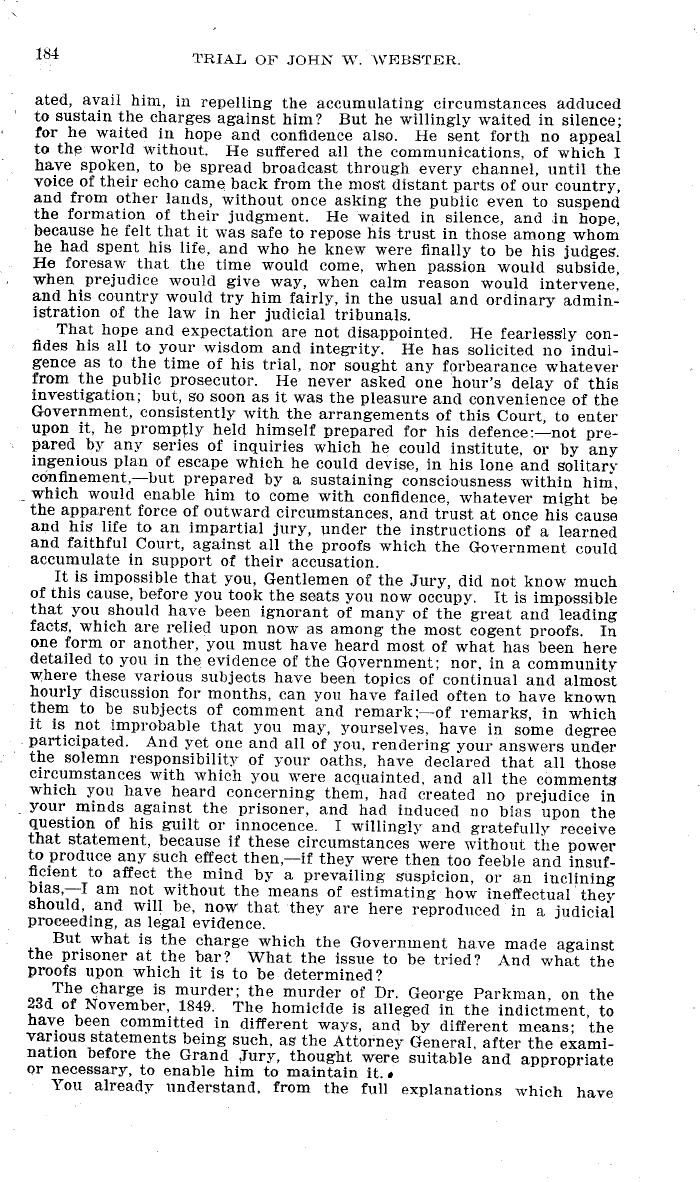|
184 TRIAL OF JOHN W. WEBSTER.
ated, avail him in repelling the accumulating circumstances adduced
to sustain the charges against him? But he willingly waited in silence;
for he waited in hope and confidence also. He sent forth no appeal
to the world without. He suffered all the communications, of which I
have spoken, to be spread broadcast through every channel, until the
voice of their echo came back from the most distant parts of our country,
and from other lands, without once asking the public even to suspend
the formation of their judgment. He waited in silence, and in hope,
because he felt that it was safe to repose his trust in those among whom
he had spent his life, and who he knew were finally to be his judges.
He foresaw that the time would come, when passion would subside,
when prejudice would give way, when calm reason would intervene,
and his country would try him fairly, in the usual and ordinary admin-
istration of the law in her judicial tribunals.
That hope and expectation are not disappointed. He fearlessly con-
fides his all to your wisdom and integrity. He has solicited no indul-
gence as to the time of his trial, nor sought any forbearance whatever
from the public prosecutor. He never asked one hour's delay of this
investigation; but, so soon as it was the pleasure and convenience of the
Government, consistently with the arrangements of this Court, to enter
upon it, he promptly held himself prepared for his defence:-not pre-
pared by any series of inquiries which he could institute, or by any
ingenious plan of escape which he could devise, in his lone and solitary
confinement,-but prepared by a sustaining consciousness within him,
which would enable him to come with confidence, whatever might be
the apparent force of outward circumstances, and trust at once his cause
and his life to an impartial jury, under the instructions of a learned
and faithful Court, against all the proofs which the Government could
accumulate in support of their accusation.
It is impossible that you, Gentlemen of the Jury, did not know much
of this cause, before you took the seats you now occupy. It is impossible
that you should have been ignorant of many of the great and leading
facts, which are relied upon now as among the most cogent proofs. In
one form or another, you must have heard most of what has been here
detailed to you in the evidence of the Government; nor, in a community
where these various subjects have been topics of continual and almost
hourly discussion for months, can you have failed often to have known
them to be subjects of comment and remark;--of remarks, in which
it is not improbable that you may, yourselves, have in some degree
participated. And yet one and all of you, rendering your answers under
the solemn responsibility of your oaths, have declared that all those
circumstances with which you were acquainted, and all the comments
which you have heard concerning them, had created no prejudice in
your minds against the prisoner, and had induced no bias upon the
question of his guilt or innocence. I willingly and gratefully receive
that statement, because if these circumstances were without the power
to produce any such effect then,-if they were then too feeble and insuf-
ficient to affect the mind by a prevailing suspicion, or an inclining
bias, -T am not without the means of estimating how ineffectual they
should, and will be, now that they are here reproduced in a judicial
proceeding, as legal evidence.
But what is the charge which the Government have made against
the prisoner at the bar? What the issue to be tried? And what the
proofs upon which it is to be determined?
The charge is murder; the murder of Dr. George Parkman, on the
23d of November, 1849. The homicide is alleged in the indictment, to
have been committed in different ways, and by different means; the
various statements being such, as the Attorney General, after the exami-
nation before the Grand Jury, thought were suitable and appropriate
or necessary, to enable him to maintain it..
You already understand, from the full explanations which have
|

